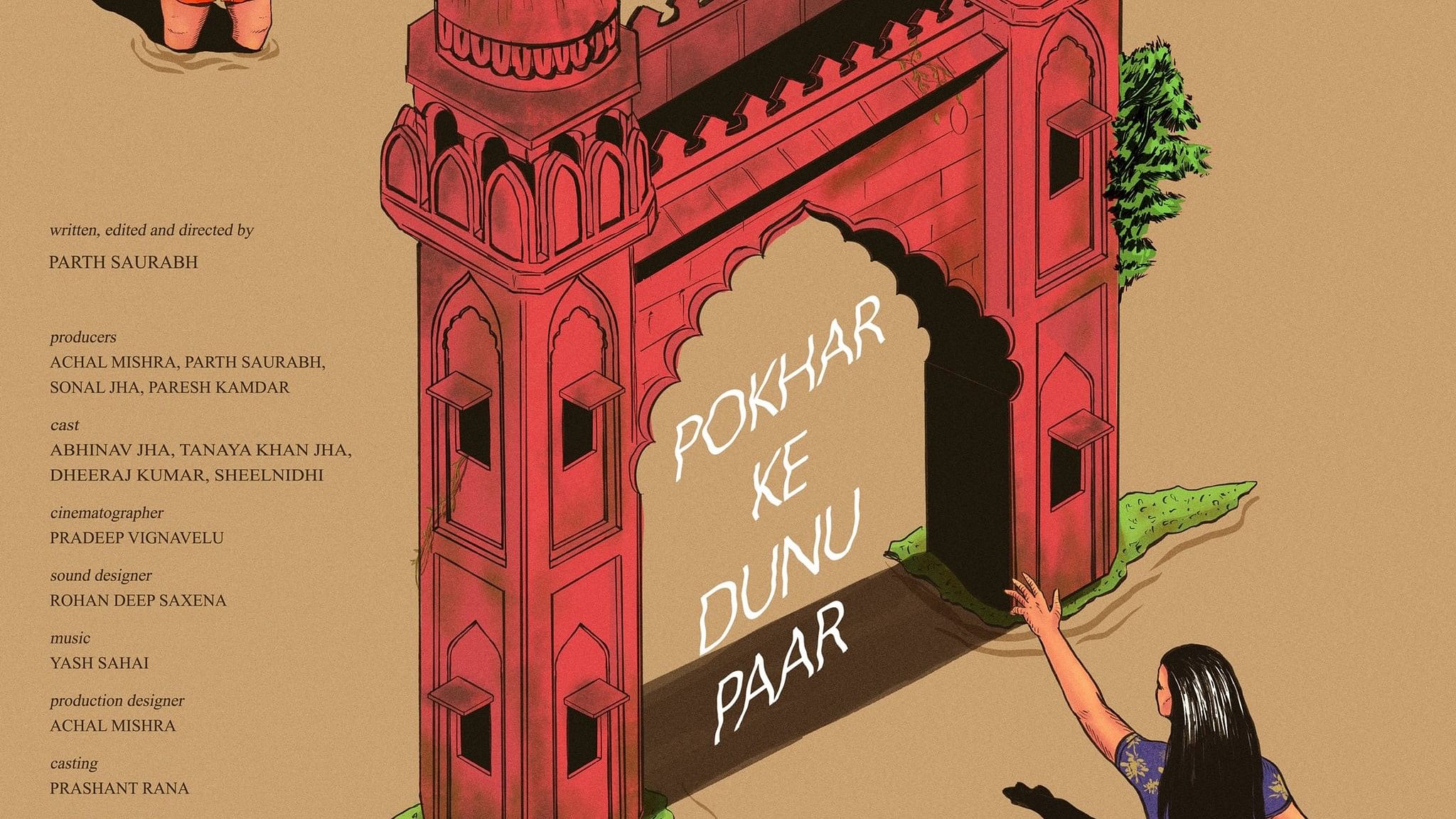
Movie poster, Pokhar ke dunu paar'
Credit: X/@anuragkashyap72
New Delhi: With Pokhar Ke Dunu Paar, a film set in his hometown Darbhanga, filmmaker Parth Saurabh believes he has managed to tell an 'authentic and lived in' story about Bihar, whose representation in cinema has been mostly as a place riddled with crime.
Saurabh, along with his producer friend Achal Mishra of Gamak Ghar and Dhuin fame, is quietly bringing about a change in how the city and the state is viewed in cinema. Critics have dubbed their movies as the 'Darbhanga wave'.
“Growing up, there was very little representation of where I was coming from. Even now, there is very little representation of actual India... Bihar is shown only as the place where crime happens," Saurabh told PTI in an interview.
"That's the only story you saw about your space when you knew there were other more authentic and lived in stories in that space. I am kind of glad that I can tell them while being fresh at it, while preserving some novelty,” he added.
Pokhar Ke Dunu Paar (On Either Sides of the Pond) has had a glorious run in the film festival circles with critics praising the first time director for his astute storytelling.
The film was screened at the Mumbai Film Festival, Dharamshala International Film Festival, the Habitat India Film Festival and received a special mention for the Kutxabank-New Directors Award at the San Sebastian International Film Festival.
While he would want his stories to reach a wider audience, Saurabh is happy that he and Mishra have changed the perception about stories from Bihar.
"It empowered a lot of filmmakers to go back home and tell their own stories in their setting. It's allowed people to realise that telling these stories is okay. And there is an audience for these stories," he said.
The germ of the idea for the film came from a conversation Saurabh had with his sister about their hometown.
"I actually love our hometown Darbhanga and she has a very different opinion of the city. So, that's where the idea took place of telling a gender-based perspective on our small town."
"In 2020 when I went back, I saw the unemployment that was in the city and it found its way in the script. The atmosphere post Covid, the feeling of just being stuck in a place and in time, it kind of combined with this relationship drama and became the film,” Saurabh recalled.
The film revolves around Sumit (Abhinav Jha) and Priyanka (Tanaya Khan Jha), a couple who elopes to Delhi but is forced to return to Darbhanga during Covid.
Sumit slips into the comfort of old friendships and habits but Priyanka feels stuck in the city that she left behind. She wants Sumit to find a job but he whiles away his time. Her conservative father lets her know through a go-between that she can come home if she leaves Sumit.
The filmmaker was also keen to explore the idea of love and elopement in a different way than what's depicted in movies, with most stories revolving around either in easy resolutions or a violent end for lovers.
Saurabh counts Federico Fellini's film I Vitelloni, Charlie Kaufman's I'm Thinking of Ending Things and Dilip Chitre's Godam as major influences for his film.
"I knew a lot of stories where people elope and they realise their mistake or when things don’t work out, I have seen these people return to their old lives. I thought they are not reflected and I wanted to include that in my film,” he said.
The film is also an exploration of the idea of home and how it can mean different things to different genders. In fact, the film was initially called 'No Road Home', a title that was changed later.
"Priyanka’s search for home is still there. She hasn’t found it. Sumit wants to probably exist in his home town and Priyanka found it when she eloped with him to Delhi. It's kind of a relationship coming to terms with the idea that maybe they want different things," he said.
The film, currently streaming on MUBI India, is presented by Anurag Kashyap and has the support of many filmmakers such as Vikramaditya Motwane, Devashish Makhija and others.
Saurabh, who studied engineering at IIT Kanpur before turning to filmmaking, said initially there was resistance at home, particularly from his doctor father.
"We struggled with this idea for a year or so. I told him this at the end of my second year in engineering. By the end of my third year, he was fine with it. He had kind of accepted that this is what I wanted to do and I am thankful for that because it is very difficult for a parent in Darbhanga to understand that your son wants to pursue filmmaking," he added.
The filmmaker, who was also part of the writing team of Anubhav Sinha's Bheed, is currently working on web shows. But he plans to go back to telling stories from Darbhanga and his next will be set in his village.